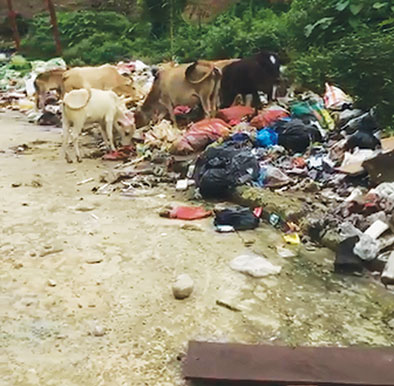[ Yaram Thadang ]
Ours is a state of pollution masked by the green hills of bamboo. There is not one place where humans have been and not littered it. The sight of a wrapper flying out from a moving vehicle is all too common. Such a swift gesture of throwing something out in the wind comes back to us in the form of streets filled with colourful and shiny waste, contrasting against the backdrop of the lush hills.
The journey of waste starts as soon as we buy a product off the market. Humans literally pay to create pollutants. Everything that ends up as garbage is something that we have had to pay for. When an individual packs up their trash, all they have in their mind is to get rid of it from their living space, and what happens next to it is not something to be bothered about. But that is just the beginning of the long journey of trash.
According to a World Bank report, India is the highest waste generator, where an individual produces up to 600 gms of waste every day, which is expected to increase to 900 gms in the next 30 years. And without proper segregation, wastes of all kinds are dumped together. The additional delay in the trash pickup service makes it worse, as the garbage stays out in the open, ending up in the stomachs of innocent animals or getting washed into the drains already blocked by the previous batch of trash.
There are many such hotspots in the capital region which we are all familiar with, or rather with the smell of them. It doesn’t matter what the news has to say about the weather; if you pass by such a spot, you will roll up your car windows. Here, holding our breath comes as naturally as breathing in. These places have been covered by many media, only for its effect to last a few days and to return to its glorious old state. No doubt that it’s the duty of the municipality to take notice of it, but aside from voicing our grievances, what we can as active participants do about it is something to ponder on.
Pollution is a sin we all commit. Not that it can be avoided, but surely it can be minimized. It is important to understand the significance of the difference a small change in our habit can make. A small change among a large number of people has a powerful impact. We can start by being mindful about not only what we bring into our houses but also what goes out. In the ongoing pandemic, when self-hygiene and cleanliness have become of utmost importance, we must make sure that we don’t forget to include our environment too. (Yaram Thadang is a mass communication student at Rajiv Gandhi University, Rono Hills)





